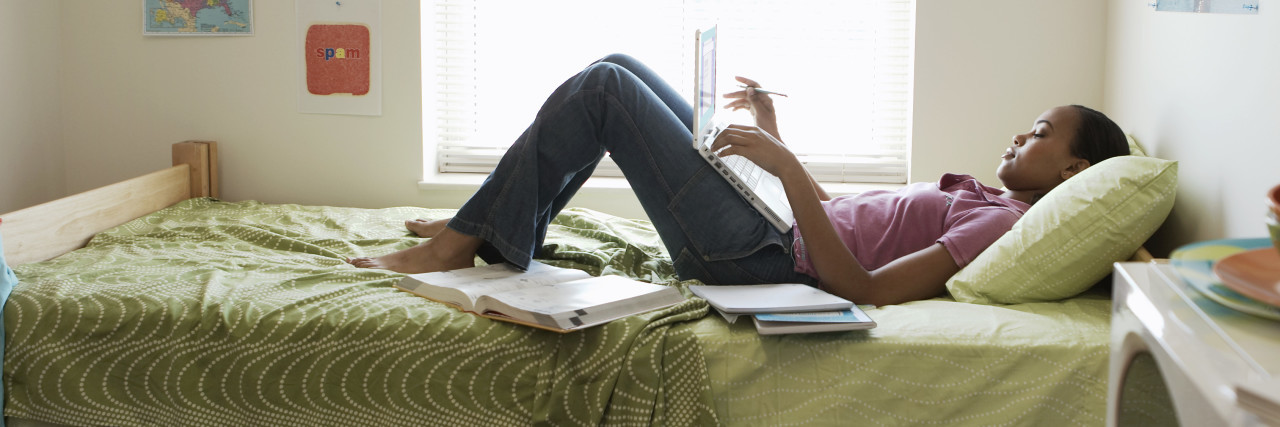As my senior year of undergrad approaches, I find myself reflecting on my time both in college and public school. While I’ve learned a lot about myself in these past three years, one of the most daunting tasks was maneuvering my chronic pain as it worsened. It became noticeable my freshman year, when I had to climb three flights of stairs to reach my dorm room. I realized I needed an accommodation my junior year, when in reality I needed it much sooner. I finally got a diagnosis of fibromyalgia, but I still had to fight to make sure I got the accommodations I needed from my school. So, given what I have learned in the past few years, here is my Back-to-College checklist for those of us living with chronic pain. They may not be things you can pack, but they’re definitely things to keep in mind.
1. Talk with your university’s Office of Disability Resources.
This is important not only for entering freshmen, but even the senior who never thought they needed accommodations can benefit from talking with their university’s office of disability resources. The people who work in this office are there to help you get the accommodations you need and make sure you receive them from professors, housing, jobs, etc. Their whole purpose is to be in your corner and make sure you can access the same educational experiences your able-bodied peers may take for granted. Find where they are on campus and reach out!
2. Be up front with your accommodation needs; don’t let others ignore them.
Sometimes you have to fight for your accommodations. I recently was placed on the third floor of a dorm again, when I had an accommodation for first-floor only rooms. While it was frustrating and took a few weeks, I eventually had someone from housing help me to stay in my current room instead of moving for the next year. I could have buckled under the stress and moved across campus to a dorm that likely would not have worked for me, but my mom (who also has fibro) encouraged me to not give up. You can’t give up when someone questions your accommodation needs. Legally, you are in the right.
3. Don’t be afraid to explain your condition to friends and peers.
Being honest with your condition is very important in personal relationships, which are the pillars of the college lifestyle. Sometimes a friend might suggest taking the stairs instead of the elevator in a building, or want to walk to a restaurant or bar that may be too far for you. It is perfectly OK to explain why that may be difficult for you. If that person passes judgment against you for your disability, they may not be that good of a friend after all. My advice would be to surround yourself with understanding and accepting people who look out for you. They may even ask if you’re doing OK when you’re not thinking about it!
4. Find a trusted professor or advisor.
While this may be easier at small schools like mine, finding someone you trust within the faculty or administration is a great asset. This can be a professor, someone in disability resources, your advisor, someone in housing, really anyone who will advocate for you that holds a bit more clout on campus than a student. Some universities have a disability studies program, and the professors who teach disability-focused classes are great places to start! After taking a disability studies course at my own university, I was able to understand myself better and create a bond with my professor, because she accepts and understands me and my condition.
5. Take breaks when fog sets in.
This is something I still struggle with, but fibro fog or chronic fatigue can strike at any time, especially when you’re stressed. I know it sometimes feels like we have to get everything done all at once or the world will collapse, but taking a break to eat, nap, or just watch Netflix is perfectly fine. Taking care of yourself in the short term will always improve the long term, and it’s always better to be well-rested for test day than fogged up.
6. Don’t feel guilty when something is too difficult.
The most important phrase to remember when living with chronic pain is “it’s not your fault.” Sometimes we can feel guilty when something is too difficult for us to do, or takes too many spoons to complete. This could be exercise, projects, or even hanging out with friends. If you’re having a flare, fog, or even your regular level of pain, do not blame yourself. Remember, you have a disability; it takes away your ability to do some things with ease. That is not your fault.
7. Find a disability rights group on campus, or if you don’t have one yet, start one!
Surrounding yourself with accepting and understanding people is easy when you find a disability rights club on campus. Making friends can be hard, and chronic pain is often isolating. Attending a disability rights club meeting can open your eyes to people with similar conditions to you, and those who have completely different conditions. Disability is diversity, and diversity should be celebrated. Don’t be scared to check out that club meeting!
8. Educate yourself on disability rights.
Understanding the disability rights movement is of paramount importance for self-advocacy. You will encounter difficulties, but knowing your rights can help counteract these difficulties. Look up the Americans with Disabilities Act. Read about how it affects you. Reach out to your office of disability resources; they are experts on it! Another important component of disability rights is self-advocacy and acceptance. Understanding that you are enough and your disability does not define you can take some time. But you are worth the time it takes.
Good luck in the upcoming year, and remember to take care of yourself, you deserve it.
Getty image by James Woodson.

